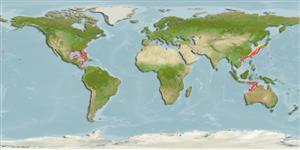Teleostei (teleosts) >
Scombriformes (Mackerels) >
Gempylidae (Snake mackerels)
Etymology: Epinnula: Refers to the lack of spinules (or finlets)..
More on author: Poey.
Environment: milieu / climate zone / depth range / distribution range
Ecology
Marine; benthopelagic; depth range 100 - 185 m (Ref. 58302). Tropical; 38°N - 19°S, 109°E - 74°W (Ref. 6181)
Western Central Atlantic: Caribbean Sea.
Size / Weight / Age
Maturity: Lm ? range ? - ? cm
Max length : 100.0 cm SL male/unsexed; (Ref. 6181); common length : 45.0 cm SL male/unsexed; (Ref. 6181)
Dorsal spines (total): 15 - 16; Dorsal soft rays (total): 17 - 20; Anal spines: 3; Anal soft rays: 13 - 17; Vertebrae: 32. Dorsal profile of head slightly elevated in front of anterior nostril, then nearly straight to origin of dorsal fin. Preopercle with two sharp spines at its lower angle. The mouth has several fangs, and a pair of large canines near the tip of the lower jaw which are exposed when the mouth is closed. Lateral line double, the lower branching off under the 5th or 6th dorsal spine. Overall color is grayish blue with the head being slightly darker than the body.
Rare species, probably mesobenthopelagic. Consumed as food (Ref. 4537). Reported to have been taken from 200-350 m in Jamaica (J. Tame pers. Comm. 08/16).
Life cycle and mating behavior
Maturities | Reproduction | Spawnings | Egg(s) | Fecundities | Larvae
Nakamura, I. and N.V. Parin, 1993. FAO Species Catalogue. Vol. 15. Snake mackerels and cutlassfishes of the world (families Gempylidae and Trichiuridae). An annotated and illustrated catalogue of the snake mackerels, snoeks, escolars, gemfishes, sackfishes, domine, oilfish, cutlassfishes,. scabbardfishes, hairtails, and frostfishes known to date. FAO Fish. Synop. 125(15):136 p. (Ref. 6181)
IUCN Red List Status (Ref. 130435)
Threat to humans
Harmless
Human uses
Tools
Special reports
Download XML
Internet sources
Estimates based on models
Preferred temperature (Ref.
123201): 17.6 - 25.4, mean 20.3 °C (based on 77 cells).
Phylogenetic diversity index (Ref.
82804): PD
50 = 1.0000 [Uniqueness, from 0.5 = low to 2.0 = high].
Bayesian length-weight: a=0.01023 (0.00426 - 0.02456), b=3.00 (2.80 - 3.20), in cm total length, based on LWR estimates for this (Sub)family-body shape (Ref.
93245).
Trophic level (Ref.
69278): 4.3 ±0.6 se; based on size and trophs of closest relatives
Resilience (Ref.
120179): Low, minimum population doubling time 4.5 - 14 years (Preliminary K or Fecundity.).
Fishing Vulnerability (Ref.
59153): High to very high vulnerability (73 of 100).
